Can you guess what movie or TV show we’re watching? We’ve turned on subtitles not to give you a clue, but to enhance that WTF effect! Leave your best guess in the comments to prove your true Flick Attackosity!
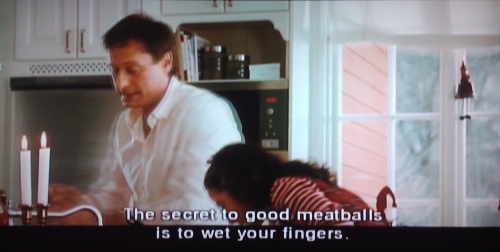
Can you guess what movie or TV show we’re watching? We’ve turned on subtitles not to give you a clue, but to enhance that WTF effect! Leave your best guess in the comments to prove your true Flick Attackosity!


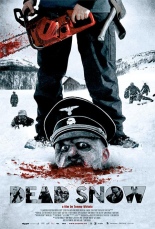 Dude, you got zombies in my Nazi war movie!
Dude, you got zombies in my Nazi war movie!
Yeah, well, you got Nazis in my zombie flick!
Wait, how about we combine them and make a movie about … zombie Nazis! They come back to life to kill a bunch of annoying med students in the mountains of Norway. We’ll call it Dead Snow and it’ll be an homage to Sam Raimi, only even wetter. We’ll have this scene where one of the zombies gets stuck in a tree and one of the heroes goes off the edge of a cliff with another Nazi zombie holding on to his waist, and the only thing that keeps them from falling all the way is that the med student is holding on to the tree Nazi’s intestines, using them as a rope.
 Yeah, and we can have a guy cut off his arm with a chainsaw because he’s been bitten and he thinks he has to cut off any body part a zombie chomps down on, and then another zombie bites him in the crotch. Just imagine the look on his face!
Yeah, and we can have a guy cut off his arm with a chainsaw because he’s been bitten and he thinks he has to cut off any body part a zombie chomps down on, and then another zombie bites him in the crotch. Just imagine the look on his face!
We can make it a little scary at the beginning and then let it all get funny, like Raimi used to do. Not too much sex, if you don’t count the guy who gets ridden hard in the outhouse just before the girl gets pulled into the dump hole.
And the best part is it doesn’t even have to be good, because one of those assholes who write for Flick Attack will kind of like it, no matter how lame it is.
Dude, I write for Flick Attack.
Really? I meant one of the other assholes.
Well, all right, then. —Doug Bentin

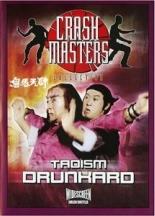 Taoism Drunkard — one in a short line of magic-themed wirefests from Yuen Woo Ping’s clan — has been called one of the wildest martial-arts movies ever made. And for good reason: It is!
Taoism Drunkard — one in a short line of magic-themed wirefests from Yuen Woo Ping’s clan — has been called one of the wildest martial-arts movies ever made. And for good reason: It is!
There are bad guys who put their enemies on a boiling-hot slide, a guy who has spikes pop out of his elbows and kneecaps, an old alcoholic who drives around haphazardly in a buck-toothed car, a ruler looking for young boys to pleasure him, a rotund woman who looks to be Asia’s Wendie Jo Sperber with hair drawn up in Shrek ears, gratuitous breakdancing, poison that turns women wrinkly and haggard and, perhaps most famously, an enormous Pac-Man-like bowling ball thing — aka “the Watermelon Monster” — with very sharp teeth who likes to pop out of a box and fight people.
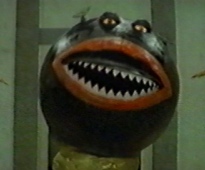 If you’re scratching your head and thinking, “How does all that come together?,” you’ve hit upon Taoism Drunkard’s major flaw: There is no story to it, making it a bit long in the tooth. It makes the Yuens’ similar (and highly recommended) Shaolin Drunkard look positively lucid. Still, it’s nuts-ass-crazy with a lot of anything-goes inventiveness (and not just in the fight scenes), and that has to count for something.
If you’re scratching your head and thinking, “How does all that come together?,” you’ve hit upon Taoism Drunkard’s major flaw: There is no story to it, making it a bit long in the tooth. It makes the Yuens’ similar (and highly recommended) Shaolin Drunkard look positively lucid. Still, it’s nuts-ass-crazy with a lot of anything-goes inventiveness (and not just in the fight scenes), and that has to count for something.
Plus, lotsa mistranslated subtitles!
• “Astronomic bastard, you have no conscience.”
• “With you know what is swollen face & nose.”
• “Want me to rub the arse again.”
• “Let me relax tonight and sleep on your bosom… very afraid of the wake up time.”
• “Remember, I want cherry boys.”
• “I give my face & mouth a wash & to urinate.”
• “Damn it, banana addict again.”
• “Perversive old man, goes back.”
• “They are her bastards? Does it really give birth to them.”
• “I want my virgin chicken.”
• “I am fallen down to death.”
• “Saliva, nose mucus, I am give you 20% discount more.”
• “Don’t beat, don’t beat, I am Mountain Dog.”
• “Don’t hurry, I am using abdominal language to joke with you.”
• “That’s why I need to have a permanent rice coupon.” —Rod Lott

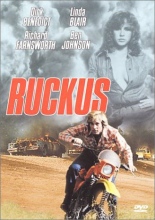 A year before Vietnam vet John Rambo took a group of rural lawmen to violent task for failing to leave him alone in First Blood, Kyle Hanson (Dirk “Starbuck” and/or “Faceman” Benedict) did the exact same thing in stuntman-turned-director Max Klevan’s lighthearted actioner Ruckus.
A year before Vietnam vet John Rambo took a group of rural lawmen to violent task for failing to leave him alone in First Blood, Kyle Hanson (Dirk “Starbuck” and/or “Faceman” Benedict) did the exact same thing in stuntman-turned-director Max Klevan’s lighthearted actioner Ruckus.
The difference here is that Hanson starts out a lot more fucked up than his more famous peer and he has the good fortune to find his redemption in the embrace of ’80s B-movie icon Linda Blair — which is all the difference in the world.
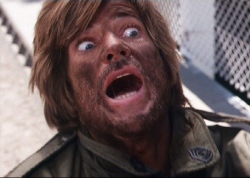 His sanity eroded by his time spent caged like an animal in a P.O.W. camp, Hanson is a disheveled, mumbling mess of a human being, which causes problems when the local small-town bigwig (Ben Johnson) sends a deputy to ask him some questions about his MIA son. Hanson has no interest in talking to anyone, but the deputy and his gang of redneck yokels refuse to take no for an answer. Unfortunately for them, what the disturbed vet may lack in social graces he more than makes up for in kicking ass!
His sanity eroded by his time spent caged like an animal in a P.O.W. camp, Hanson is a disheveled, mumbling mess of a human being, which causes problems when the local small-town bigwig (Ben Johnson) sends a deputy to ask him some questions about his MIA son. Hanson has no interest in talking to anyone, but the deputy and his gang of redneck yokels refuse to take no for an answer. Unfortunately for them, what the disturbed vet may lack in social graces he more than makes up for in kicking ass!
A much kinder, gentler film than First Blood, Ruckus pleases, thanks to the efforts of its talented cast members who are able to invest dimensions and authenticity into characters that walk along the wrong side of cliché. Richard Farnsworth is typically great as the reasonable sheriff who can’t believe the situation his moronic underling has gotten him into, and Blair is a lovely delight as the lonely wife of Johnson’s missing son. —Allan Mott

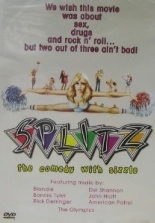 Before I watched it just now, Splitz lingered in my memory as one of those movies every video store in the ’80s seemed to have, but no one ever seemed to rent. It had one of those strange video covers you always noticed on the shelf, but never felt obligated to pick up. I had always assumed it was about a bunch of sexy girls who triumph over the domination of another group of sexy girls via the power of aerobic cheerleading — kind of a combination of H.O.T.S. and Heavenly Bodies.
Before I watched it just now, Splitz lingered in my memory as one of those movies every video store in the ’80s seemed to have, but no one ever seemed to rent. It had one of those strange video covers you always noticed on the shelf, but never felt obligated to pick up. I had always assumed it was about a bunch of sexy girls who triumph over the domination of another group of sexy girls via the power of aerobic cheerleading — kind of a combination of H.O.T.S. and Heavenly Bodies.
Turns out my imagination was wrong, and it’s really about how a trio of sexy female musicians join forces with their manager to help a bunch of homely girls triumph over the domination of two groups of other homely girls via the power of intramural college athletics.
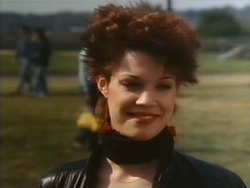 What really surprised me about Splitz was how much I was charmed by it. That’s not to say it’s a good movie — it’s far too hamstrung by the competing sensibilities of its four credited screenwriters to work as a successful whole — but I found it full of enough charming characters and worthwhile moments to allow me to patiently get through the scenes that were obviously written by whichever of the four writers was a hack-tastic moron.
What really surprised me about Splitz was how much I was charmed by it. That’s not to say it’s a good movie — it’s far too hamstrung by the competing sensibilities of its four credited screenwriters to work as a successful whole — but I found it full of enough charming characters and worthwhile moments to allow me to patiently get through the scenes that were obviously written by whichever of the four writers was a hack-tastic moron.
I will admit that I’m probably biased by my affection for movies that feature sexy all-girl bands. As a fake band, The Splitz are a surprisingly catchy trio — nowhere near as good as The Carrie Nations, but in the same league as Josie and the Pussycats. Robin Johnson (Times Square) especially stands out as Gina, the group’s lead guitarist who looks like a New Wave goddess, but sounds just like Jo from The Facts of Life (which is really much hotter than it sounds). —Allan Mott